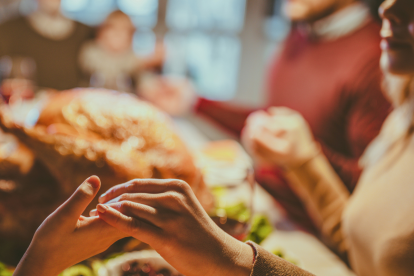Tips for Surviving the Holidays When You Have Borderline Personality Disorder

Borderline personality disorder is a mental illness that causes difficulties in relationships, everyday functioning, self-image, and emotional regulation. If you have this personality disorder, you may feel even worse during the holidays, when stress and pressure intensify. Rely on those people you know and trust to have your best interests at heart, avoid withdrawing from socializing, and use positive coping strategies to manage stress and emotions. If necessary, check in for residential treatment.
Living with borderline personality disorder (BPD) is difficult even at the best of times.
This condition makes you think and act in ways that make it hard to develop positive, stable relationships, to manage work and home responsibilities, and to regulate your emotions and behaviors.
When the stress of the holiday season builds up, you may struggle even more.
Depression, substance use, and other mental health issues may creep in; you may feel tempted to withdraw from others; and your symptoms may get worse.
What you need now are positive, healthy strategies for managing symptoms and getting through this tough time.
Practice Healthy Coping Strategies for Stress
With BPD, you are already prone to intense mood swings, angry outbursts, impulsive behaviors, and self-harm. The stress, pressure, and expectations of the holidays can intensify these symptoms and worsen your emotional responses.
Now more than ever you need to rely on healthy, productive, and positive coping strategies for difficult emotions. Use them when you feel stressed out, when your emotions threaten to boil over, when you feel like yelling at someone else, or if you feel tempted to self-harm. Some examples of healthy ways to manage and lessen stress include:
- Exercise
- Talking about it with a trusted friend or family member
- Activities you enjoy and find relaxing, like reading or a hot bath
- Deep breathing and breathing exercises
- Yoga
- Meditation
- Progressive muscle relaxation
In some situations it’s best to walk away from what is causing stress. A certain person who makes you feel bad about yourself, for instance, or a party that you just can’t face attending may cause more stress than you can handle. Know when to face your fears and stressors and when it’s better to avoid them.
Abstain From Alcohol
You can expect to encounter a lot of drinking at parties and family gatherings during this time of year. It may be tempting to manage your stress and BPD symptoms by indulging, but this will backfire. Alcohol won’t fix your problems and may only mask your struggle. You could end up getting drunk, saying things you regret, getting in fights, damaging relationships with those you care about, and worsening mental health symptoms.
People with BPD are at an increased risk of developing a substance use disorder. Any problematic drinking behaviors can be a bigger risk for you than for others. Drinking as a way to cope with difficult emotions or situations is considered alcohol abuse.
Avoid Isolation
It can be difficult to cope with the stress of the holidays when you have BPD, and your instinct may be to withdraw and try to manage it on your own. Studies show that loneliness is a real issue for people living with this personality disorder, so isolating from others will only make this worse.
To minimize and remedy loneliness during the holiday season, it helps to get involved. Say yes to party invites and go with a friend; go with family to holiday services; participate in that workplace secret Santa gift exchange; or volunteer with a local soup kitchen. Anything you can do to get more socially involved will help stave off loneliness.
Surround Yourself With Trusted Loved Ones
Resisting the urge to withdraw socially is so important right now, as is spending more time with people. But it’s also important to recognize which people are best for you and that you can trust to have your best interests in mind.
Difficulty with personal relationships is a hallmark of BPD. It causes you to fear abandonment, to be clingy and needy, and to develop relationships that are unstable and unfulfilling. During the stressful holiday season, it’s important to stay close to those few people you know and trust.
Although it may not always feel like it, these people will not abandon you. They want the best for you and genuinely want you to feel safe and loved. New relationships right now or interactions with people you’re unsure you can trust are fraught with extra stress and risk. While working on new relationships can be positive and healthy, during the holidays you’ll feel better if you stick close to those you trust most.
Begin Your Recovery Journey.
877-727-4343Meet Depression Head On
This time of year is often a trigger for depression, and people with BPD have a high risk of also having co-occurring depression. Staying socially active and spending time with people who care about you are important ways to try to manage depression.
It’s also important to face any feelings of sadness or hopelessness rather than avoiding them. Be aware of your moods, stop to think about what’s bothering you and how you feel as your mood shifts, and if you are feeling sadder than usual, take steps to remedy it. This may mean talking to your doctor or seeing your therapist more regularly to discuss ways to manage depression.
Check In for Treatment if Needed
Whether you have been to treatment for BPD previously or not, reach out for help now if you need it. This is a very difficult mental illness to live with, especially during a time of year that triggers extra stress, depression, and anxiety.
Now may be the best time to seek professional help in a residential setting. A good treatment facility can provide you with a safe place, not just to ride out the holidays but to heal, learn, and develop better coping skills to improve your life and relationships.
In treatment for borderline personality disorder, you can expect to benefit from individualized therapy that is specifically designed to help people learn how to manage personality disorders. You’ll also get group therapy and social support in a strong community, alternative therapies, coping strategy practice, relationship building and skills, and holistic healthcare with positive lifestyle habits.
How to Help a Loved One With BPD
If you are the friend, partner, or family member of someone living with BPD, it’s important to support them during this difficult time of year. Be there to listen to them without judgement and to be the person they can rely on when they feel lost or unsafe. Encourage them to get involved in holiday activities, but also know when to stop pushing. Distract them when emotions threaten to rise to an outburst.
Most of all, if you care about someone who is struggling right now, help them get the professional support they need. Push for residential care if you are worried they won’t make it through the season without serious emotional or even physical damage.
BPD is always a challenging mental illness, but at this time of year it can become overwhelming. It’s not unusual to see symptoms flare up that have otherwise been well controlled. This is a chronic mental health issue, and triggers will cause relapses. Know what you need to do to feel well and don’t be afraid to ask for help, from loved ones as well as trusted professionals.
Bridges to Recovery offers comprehensive treatment for people struggling with mental health disorders as well as co-occurring substance use disorders. Contact us to learn more about our renowned Los Angeles-based program and how we can help you or your loved one start on the path to lasting wellness.






